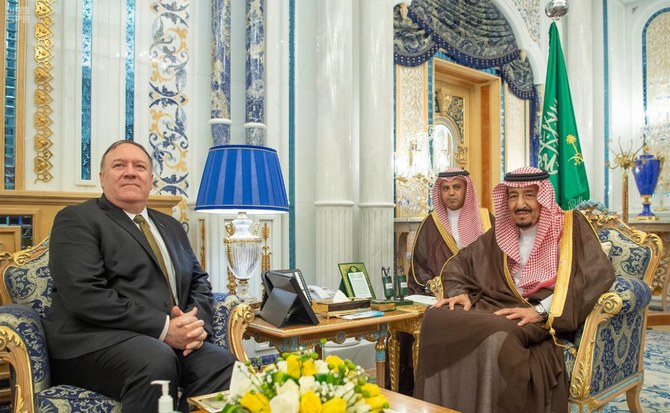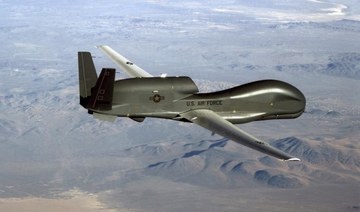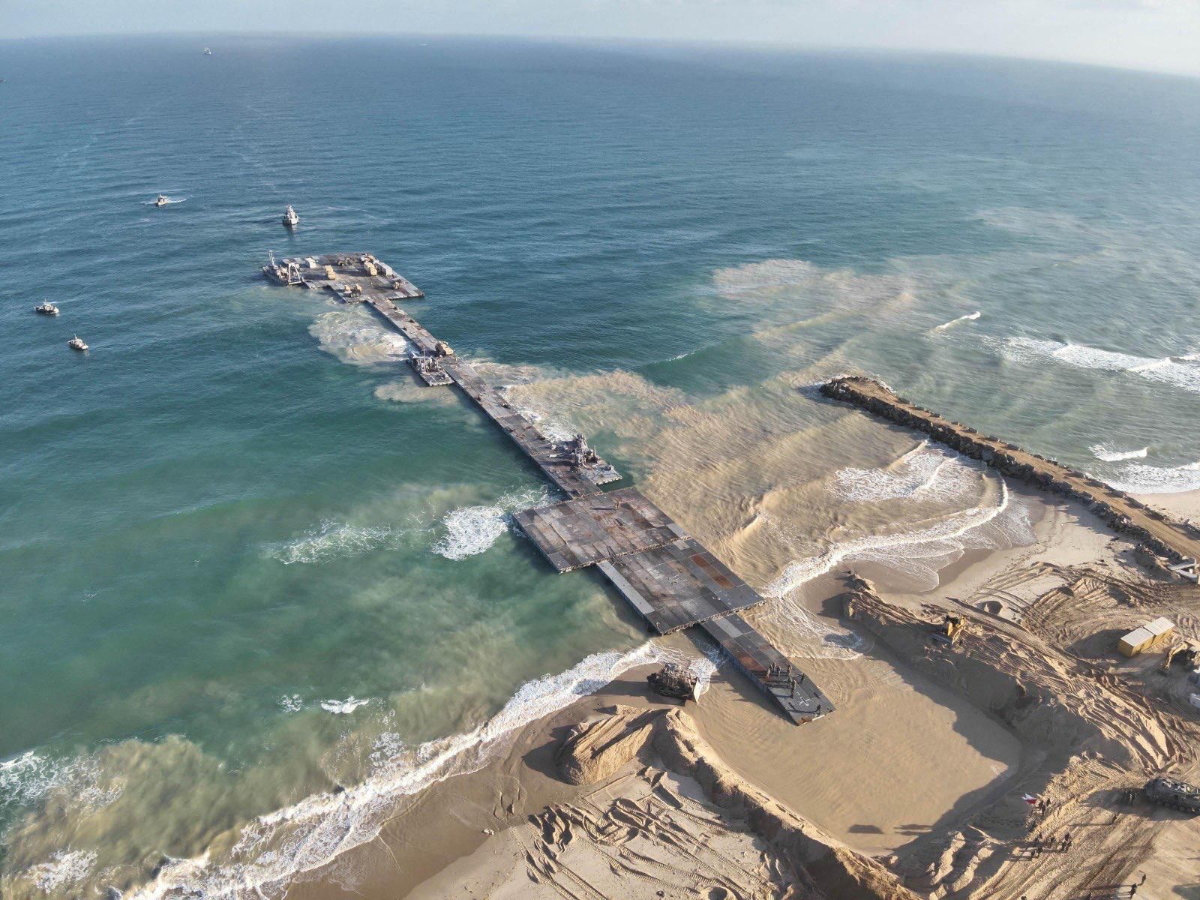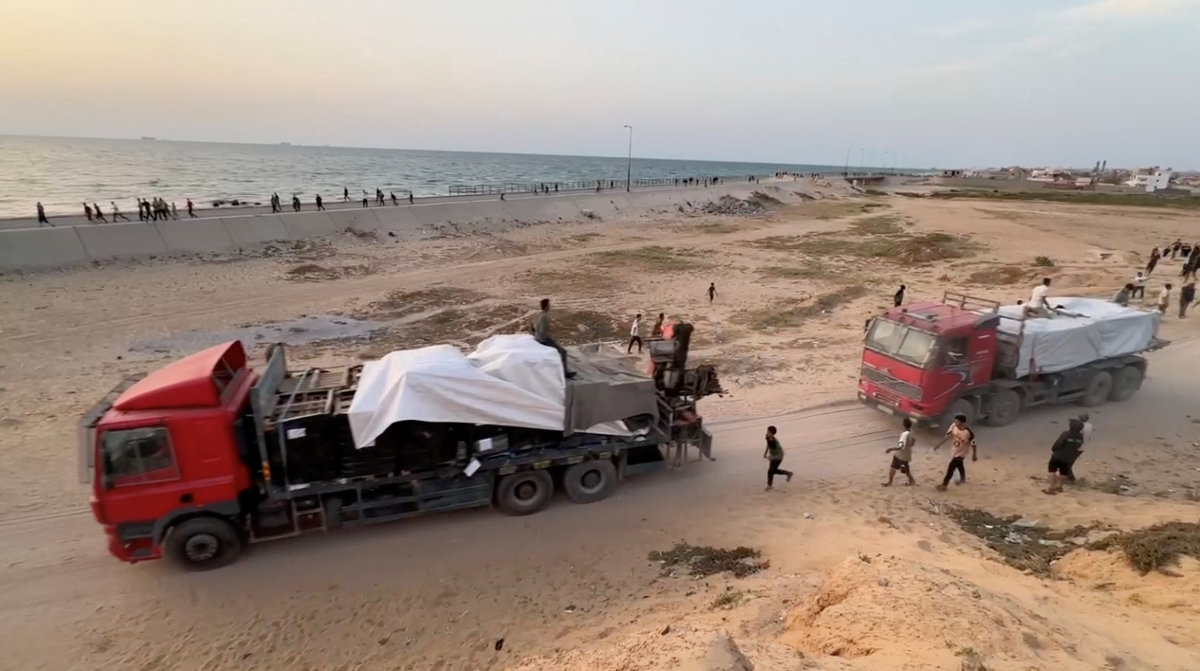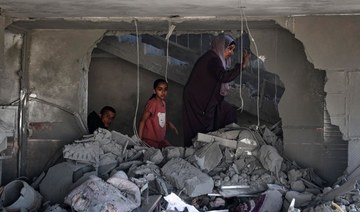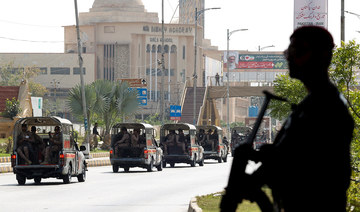DUBAI: US Secretary of State Mike Pompeo held talks Monday with the Saudi king and crown prince about countering the military threat from Iran by building a broad, global coalition that includes Asian and European countries.
Pompeo is likely to face a tough sell in Europe and Asia, particularly from those nations still committed to the 2015 nuclear deal with Iran that President Donald Trump repudiated last year.
With tensions running high in the region after Iran shot down a US surveillance drone on June 20 and Trump said he aborted a retaliatory strike, Iran’s naval commander warned that his forces won’t hesitate to down more US drones that violate its airspace. The US has been building up its military presence in the Arabian Gulf.
The US announced additional sanctions Monday on Iran aimed at pressuring the Iranian leadership into talks. The sanctions, re-imposed after Trump withdrew from the nuclear deal, have crippled the Iranian economy and pushed up the cost of living. Iran has decried US sanctions, which essentially bar it from selling its oil internationally, as “economic terrorism.”
#UPDATE: Having met with King Salman earlier Monday, US Secretary of State Mike Pompeo met with Crown Prince Mohammed bin Salman before heading off to #UAE for further talks on #Iranhttps://t.co/KJIvvQDvAk pic.twitter.com/cTRzEVVNxG
— Arab News (@arabnews) June 24, 2019
Pompeo, considered a hard-liner in Washington, referred to Iran as “the world’s largest state sponsor of terror” before he embarked on the hastily arranged Middle East stops on his way to India, Japan and South Korea.
He said he’d be speaking with leaders in Saudi Arabia and the United Arab Emirates “about how to make sure that we are all strategically aligned, and how we can build out a global coalition ... not only throughout the Gulf states, but in Asia and in Europe” that is prepared to push back against Iran.
But Germany, France and Britain, as well as Russia and China, remain part of the nuclear accord that lifted sanctions on Iran in exchange for set limits on its uranium enrichment levels. Trump pulled the US out of the deal last year.
Germany, Britain and France have sent envoys to Tehran recently, signaling they remain committed to diplomacy and dialogue. They cautioned against moves that can lead to conflict between the US and Iran.
Berlin appears cool toward US talk of a global coalition against Iran as it tries to salvage the nuclear deal. German media have drawn parallels between Pompeo’s talk of a coalition and President George W. Bush’s “coalition of the willing” against Iraq in 2003, which Germany and France opposed.
German Foreign Ministry spokesman Christofer Burger said his country had “taken note via the media” of Pompeo’s comments and that Germany’s “top aim is and remains a de-escalation of the serious situation.”
On Monday, Trump tweeted that China and Japan depend on the security of the Arabian Gulf waterways for the bulk of their oil imports, and he asked why the US is protecting the shipping lanes for other countries “for zero compensation.”
I’m heading out today. Our first stops will be in the Kingdom of Saudi Arabia & the UAE, two great allies in the challenge that Iran presents, and we’ll be talking with them about how to make sure that we are all strategically aligned and how we can build out a global coalition. pic.twitter.com/txu0pA2xr4
— Secretary Pompeo (@SecPompeo) June 24, 2019
“All of these countries should be protecting their own ships on what has always been a dangerous journey.” He said the US doesn’t “even need to be there” because it produces much of its own energy needs.
Brian Hook, the US special envoy for Iran, said one option could be to “enhance” an existing multinational maritime force of about 30 countries that currently fights drug and arms smuggling in the region.
Alternatively, he said allied nations with commercial interests in the oil-rich region could launch an all-new maritime security initiative.
Another option could be military ships patrolling the Gulf waters and equipped with surveillance equipment to keep watch on Iran.
The narrow Strait of Hormuz, which lies between Iran and Oman and opens to the Arabian Gulf, is paramount for Asian oil importers. An estimated 18 million to 20 million barrels of oil — much of it crude — pass through the strait every day.
The US Navy, which has its 5th Fleet based in Bahrain to protect the strait, escorted oil tankers to ensure American energy supplies in the 1980s when Iran and Iraq were targeting each other’s exports, but the US is no longer as reliant on Arabian producers.
Today, any conflict that threatens tankers would badly disrupt crude supplies for energy-hungry countries like China, Japan, South Korea, Singapore and Indonesia, which are among the top five importers of Arabian oil.
After his meetings in Saudi Arabia with King Salman and Crown Prince Mohammed bin Salman, Pompeo tweeted that he had a “productive meeting” with the monarch and discussed “heightened tensions in the region and the need to promote maritime security” in the Strait of Hormuz.
Productive meeting with King Salman bin Abdulaziz Al Saud today to discuss heightened tensions in the region and the need to promote maritime security in the Strait of Hormuz. Freedom of navigation is paramount. pic.twitter.com/efuZq5EOpK
— Secretary Pompeo (@SecPompeo) June 24, 2019
Pompeo then traveled to neighboring Abu Dhabi in the United Arab Emirates, another close US ally.
The US Mission in the UAE said that Pompeo would discuss “building a global coalition to counter the world’s largest state sponsor of terror” during his visit to Abu Dhabi.
The regional stops may be aimed at reassuring Washington’s Gulf Arab allies that the White House remains committed to keeping pressure on Iran following Trump’s decision against retaliation, which likely raised questions about US willingness to use force against the Islamic Republic. On a visit to Israel on Sunday, US National Security Adviser John Bolton, also considered a US hard-liner, said Iran should not “mistake US prudence and discretion for weakness.”
Iran’s naval commander, Rear Adm. Hossein Khanzadi, declared that Tehran is capable of shooting down other American spy drones that violate its airspace, saying “the crushing response can always be repeated.” He spoke during a meeting of defense officials in Iran.
Trump has wavered between bellicose language and actions toward Iran and a more accommodating tone, including an offer for negotiations. Iran has said it is not interested in a dialogue with Trump.
Saudi Arabia and the US accused Iran of being behind attacks on tankers near the Arabian Gulf in recent weeks, while the UAE has been urging diplomacy to avert a wider conflict.
On the eve of Pompeo’s visit to the Kingdom, Yemen’s Iranian-allied Houthi militia attacked a Saudi airport near the Saudi-Yemen border, killing a Syrian resident and wounding 21 other civilians, the Saudi military said.
The Houthi militia claimed they used bomb-laden drones to attack the Abha airport, the second in less than two weeks. Drones were also used against a Saudi oil pipeline last month.
In a statement, Pompeo condemned the Abha airport attack and said the war in Yemen is not an isolated conflict. He accused Iran of funneling cash, weapons, and armed support to the Houthis, which Iran denies.






